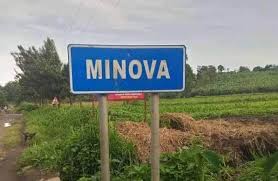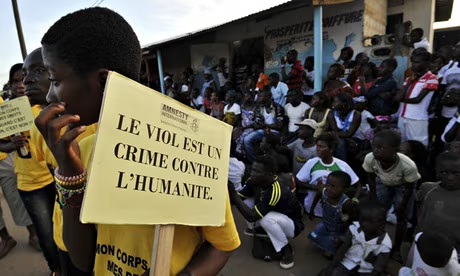47TH Ordinary Session of the African Commission on Human and Peoples’ Rights, 12th-26th May, 2010, Banjul, The Gambia
Statement by the Institute for Human Rights and Development in Africa (IHRDA), Plan International and Save The Children Sweden on the state of violence against children in schools.
The Institute for Human Rights and Development in Africa (IHRDA), Plan International and Save the
Children Sweden (SCS) wish to bring the situation of violence against children in schools to the attention of the African Commission on Human and Peoples’ Rights. Violence against children in schools constitutes a violation of their rights protected under articles 5, 9(2), 16, 17, and 18(1) and (3) of the African Charter on Human and Peoples’ Rights.
‘School-based violence is not a problem confined to schools but a complex, multi-faceted societal issue. Schools are social spaces within which the power relationships, domination and discrimination practices, of the community and wider society are reflected. Violence against children in schools is linked to socio-cultural traditions, political agendas, the weaknesses of educational systems, community practices and to global macro-economics.’1 This context of violence against children in schools and its repercussions is borne out of a study conducted by Plan West Africa, UNICEF, Save the Children Sweden West Africa and Action Aid, which was published in March 2010.
School-based violence takes various forms, namely: corporal and degrading punishment, sexual violence, abuse and exploitation, and other forms such as psychological violence and bullying, fighting and obligatory chores. Both boys and girls are affected by school-based violence but the girls are more affected given vulnerable to sexual violence, abuse and exploitation.
Sadly, the perpetrators include persons who are expected to protect and care for children, namely: teachers, school staff, male fellow students but also young men, soldiers, and bus drivers, among others.
Subjecting children to physical punishment and obligatory chores, sexual violence and abuse, for example, in most cases amounts to torture, inhuman and degrading treatment, which undermines their dignity as human being as envisaged by article 5 of the African Charter on Human and Peoples’ Rights (ACHPR) and article 11-5 (and 16, 11- 3(d)) of the African Charter on the Rights and Welfare of the Child (ACRWC).
School-based violence in all its ramifications makes children live in fear of expressing their opinions for fear of being victimized, thus undermining their freedom of expression under article 9(2) of the ACHPR and article 7 of the ACRWC. A child from Togo put it succinctly thus ‘If the teacher hits me, everything immediately goes from my head. Even if I had lots of ideas before, the moment he hits me, I lose everything – I can’t think.’2
Sexual violence in particular has grave consequences on the child’s right to health. Girls and boys are at serious risk of HIV infection and sexually-transmitted infections. Boys are at abused through sodomy and other forms of sexual abuse. For girls, early and unwanted pregnancies endanger their lives and the unborn child, which raises the risk of illegal and risky abortions. In most cases, the education of girls is compromised once they become pregnant. This constitutes a gross violation of the child’s right to health and education under articles 16 and 17 of the African Charter on Human and Peoples’ Rights respectively. Sometimes the sexual violence is exacerbated by forcing girls into early marriage, thus cutting short their education in violation of article 11(6) of the African Charter on the Rights and Welfare of the Child as well as articles 12(1)(c) and (2)(c) of the Protocol to the African Charter on Human and Peoples’ Rights on the Rights of Women in Africa.
In further violation of the right to education, evidence from Togo, Liberia and Ghana show that obligatory chores in teacher’s houses increase the children’s vulnerability to other forms of violence and reduce the time children can dedicate to learning, resting or recreation.
Article 18(3) of the African Charter places a duty on State Parties to protect the rights of women and children as stipulated in international declarations and conventions, which include the African Charter itself, the African Charter on the Rights and Welfare of the Child and the UN Convention on the Rights of the Child, all of which prohibit violence against children.
In spite of this duty, school-based violence is still prevalent in Africa. Consequently we recommend
that the African Commission collaborates with the African Committee of Experts on the Rights and Welfare of the Child to strongly urge State Parties to the Charter to:
- Recruit qualified teachers and encourage the recruitment of female teachers in the public education system;
- Invest in teacher training, particularly on alternative forms of correction and professional development and strengthen professional standards and establish a code of conduct for teachers;
- Enforce and harmonise legislation and policies for the protection of children from school- based violence and the prosecution of perpetrators;
- Increase the evidence-base to inform policies by establishing a centralised mechanism to record, report and monitor violence against children in and around all types of education institutions;
- Develop or improve coordination mechanisms between education, social and medical services at the national and local levels to increase violence prevention and strengthen the speed and effectiveness of intervention when necessary; and Create availability and accessibility of reporting mechanisms for children to report cases of violence in school and also establish mechanisms for reintegrating children who suffer from school-based violence into the school system to enable them effectively complete their education.





